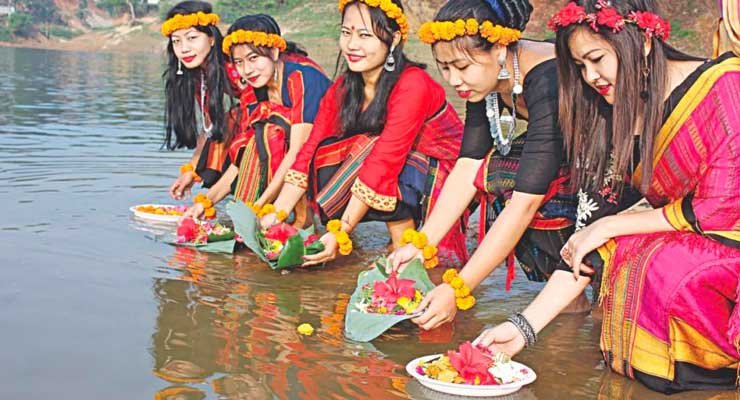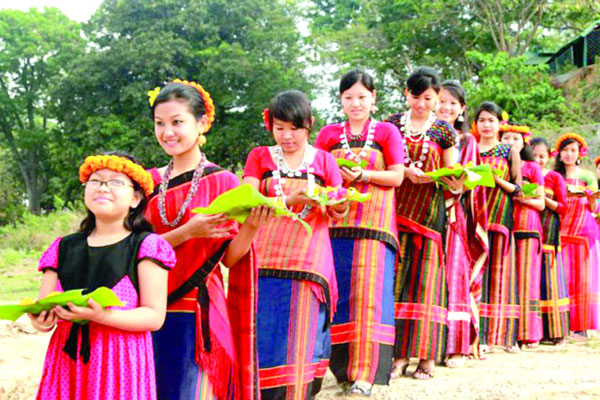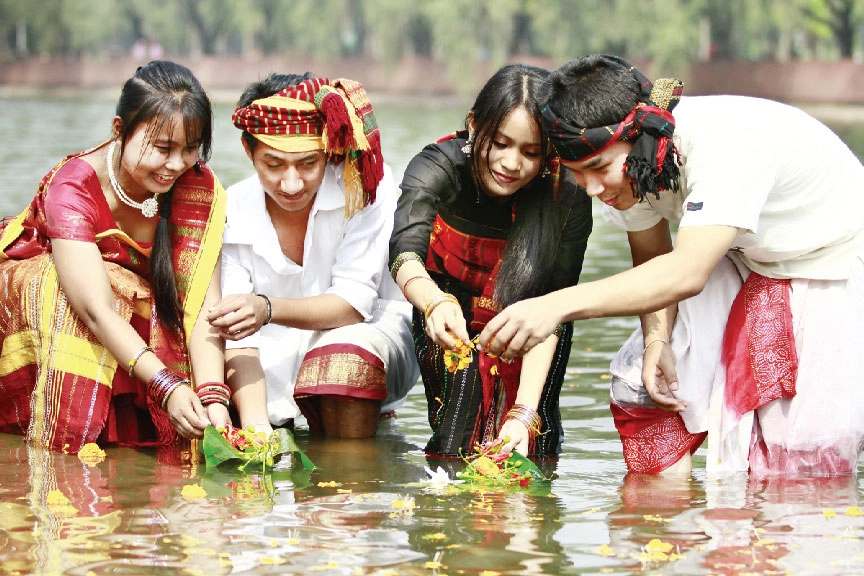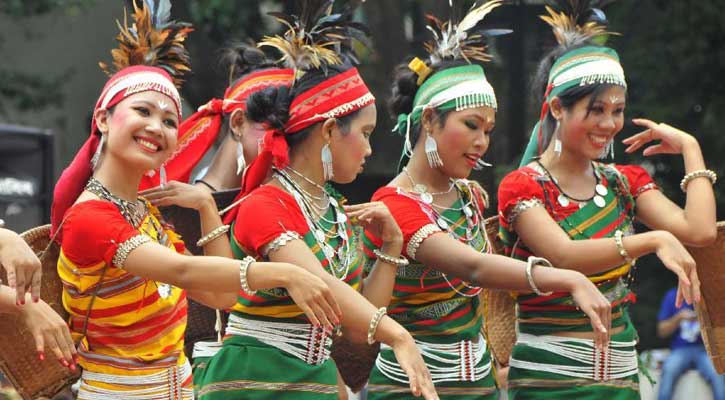Sekh iraj
Vaisabi is the main festival in the hills of Chittagong Hill Tracts District. The three main hill communities celebrate the festival under different names. This festival of the hills is called ‘Baisuk’ by the Tripuras, ‘Sangrai’ by the Marmaras and ‘Biju’ by the Chakmas. The Baisuk of Tripuras is known as ‘Bai’, the Marmas of Sangrai as ‘Sa’, and the Chakmas of Biju as ‘B’ collectively known as ‘Vaisabi’.
Sangrai
The Marma tribes celebrate this New Year festival called Sangrai. This festival lasts for four days. First, the Marmas all go to the river with the image of Buddha and bathe the image with milk or sandalwood water. Then the picture is taken back to the previous place, i.e. temple or home.
The Marma community, since ancient times, has been holding various ceremonies to mark the departure of the old year and the arrival of the new year in a different way from other communities, known as Sangrai in the Marma language. The word ‘sangrai’ is thought to have originated from ‘sakrai’ (sal), known as ‘Sankranti’ in Bengali.
The day of Sangrai is fixed by the formation of ‘Sangrai Jai’ (Marma Calendar) of the Marma community. This ‘sakrai’ or year is counted before 1359 AD, known as ‘jya sakrai’.
There are various myths in the Marma language about the origin of Sangrai, which are still prevalent among the Marma elders. However, no detailed history has yet been found as to when the Sangrai celebration of the Marmas began. The Marmaras celebrate the Sangrai festival for three days. The first day of Sangrai is called ‘Sangrai Akya’ or ‘Paying Doak’ in Marma (flower collection on the first day of Sangrai). The second day is known as ‘Sangrai Bak’ (Day of Sangrai), and the third day is known as ‘Sangrai Upaying’ (Sangrai Farewell). The Marmaras organize various religious ceremonies, sports, food, and drink during these three days.
Sangrai Akya or Paying Choya (first day of Sangrai or flower collection)
On this day, the Marmaras clean their houses, courtyards and surrounding streets ahead of the upcoming holy Sangrai. On this day, the Marmaras all clean the monastery by reciting the holy sutras.

Sangrai Bak (Day of Sangrai)
On this day, the Marmas in the villages begin collecting flowers on their initiative from very early in the morning. The Marmas believe that the more flowers one gathers and worships the Buddha on this day, the more merit one will achieve. Many people travel to Bihar to worship Ashtamashil for three days during Sangrai.
Many people travel to Bihar early in the morning to give the Buddha ‘Angrung Choing’ (meal for all the monks). On this day, the monks of Bihar give Dharma Desna. The ‘Doaing’ charity ritual (monks’ lunch) begins at noon. After the monks have received their prayers in the afternoon, Buddha’s bathing ceremony is held with ‘Ningsa’ (Sugandhikab unique) water and coconut water.

Sangrai Upaying (Farewell to Sangrai)
The Marmas consider this day to be the start of the new year. Flower worship and dota (food donation) are performed on this day. Cakes are distributed among the devotees who visit Bihar on this day. In villages, neighbours exchange cakes. When they got to each other’s house, the smell of cake was in the air. Cakes are also given to the local elders on this day.
Baisuk
The Tripura observe this day by worshipping Shiva and asking forgiveness from him.
Democracy or digestion
The tribals’ favourite dish is ‘Ganatmak or Pachan,’ prepared during the Vaisabi celebration. Aside from that, there are numerous sorts of cakes, semai, muri-chanachur, and various fruits and cold drinks available. In addition, 25 to 30 different varieties of vegetables are used to make mixed vegetables. However, as the forest cover in the Chittagong Hill Tracts declines, so does the quantity of vegetables available.

Water festival
The water festival is well-known throughout the city. This is also included in the Vaisabi festival. All of the tribals participate in this celebration by throwing water on each other. To wash away all of the sorrows and misdeeds of the previous year. There had been a water worship ceremony earlier. As a result, the bond between them is strengthened. Marma teenagers express their love for one another by showering water on a person of their choice in front of the entire group.

